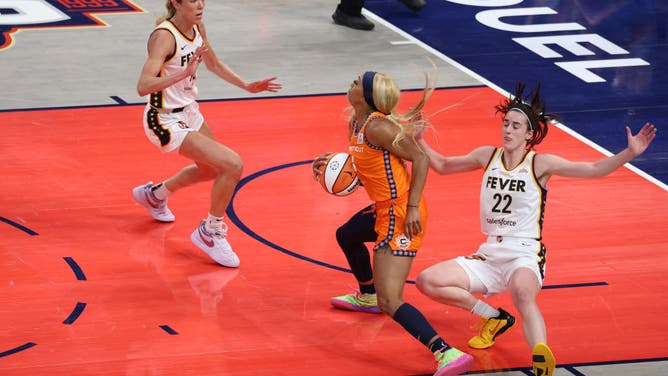Caitlin Clark Let The Race Bullies Win | Bobby Burack
The race bullies are winning.
In an interview with David Letterman on Netflix, WNBA star Caitlin Clark acknowledged her "privilege" as a white woman in the WNBA.
"I definitely have privilege," she told Letterman in an episode of "My Next Guest Needs No Introduction" recorded in December that aired this week. "I’m obviously white, but I think I’m somebody who grew up a huge fan of this league. I grew up watching this league, going to games, supporting this league. So I know where this league comes from: a lot of black women that grew up making this league what it is. And that’s kind of the shoulders that we stand on."
Clark adds the black women before her "deserve all the credit" and "there is [a] responsibility in acknowledging that."
Uh, what?
To recap, Clark entered the WNBA last season as its first mainstream attraction in nearly two generations. ESPN framed her popularity as a symptom of an intolerance for a league full of black lesbians. Various black women in the WNBA fell for the lie and responded by hard-fouling, harassing, and slurring Clark on the court. To try and ease the animus, Clark has responded with two faux admissions of her "white privilege," the first during a Time Magazine profile late last year.
Did we miss anything?

INDIANAPOLIS - Indiana Fever guard Caitlin Clark (22) falls to the floor while guarding Connecticut Sun guard DiJonai Carrington (21) on August 28, 2024, at Gainbridge Fieldhouse. (Photo by Brian Spurlock/Icon Sportswire via Getty Images)
We recognize that Clark finds herself in an unenviable position. Her opponents – and teammates – abhor her, in part, because she is straight and white. She is relatively apolitical in a league in which LGBTQ-ism is woven into the culture. Commentators like Monica McNutt continue to put a target on her back by framing her popularity as great white hope-ism.
Clark just wants to play basketball. At 23 years old, she seemingly figures that the only way to get along is to go along. But she's wrong. Mean girls don't lay off those who cower. They prey on their weakness.
When Clark apologized for her "privilege" for the first time, the usual suspects framed her comments as proof that racism was to blame for her popularity.
"White privilege is real, and sports is no exception. CC is self aware enough to understand that Black women who have accomplished things similar to what she has haven’t received the same marketing and endorsement opportunities," Jemele Hill posted on X.
Oh, and what about Serena Williams and Simone Biles?
Commentators like Hill try to ingrain in black Americans the lie that the success of white people is at their expense. And that's how many WNBA players view Clark's success: at their expense.
In actuality, Clark's popularity will elevate the status of every current and future WNBA player, regardless of their race. Unfortunately, there is too much racial hostility instilled in the WNBA for most players to understand that. They'd rather the league crater than thrive on the back of a straight white girl from Iowa.
And yet, Clark is the one apologizing.
As OutKick host Tomi Lahren stated on Tuesday night, Clark is "a grown woman and lacked the intestinal fortitude to reject the woke mob." In return, she empowered the mob. And the mob's plans for her are ambitious.
We explained last summer that the plan was never to bully Clark out of the WNBA. The plan was always to browbeat her into becoming one of them.
Black women in the WNBA didn't just reject Clark because she is straight and white. Cameron Brink, who was drafted one pick after Clark, is also straight and white. But unlike Clark, Brink entered the WNBA with remorse for her "privilege."
"I could go way deeper into this, but I would just say growing the fan base to support all types of players. I will acknowledge there’s a privilege for the younger white players of the league," Brink said. "That’s not always true, but there is a privilege that we have inherently and the privilege of appearing feminine."
Clark didn't do that. As a white girl and the biggest star in the WNBA, she chose not to use her transcendent platform to spread the LGBTQ and BLM agendas.
That, above all else, is why the race bullies, the mean girls, and ESPN hated her so much. So they beat her down until she changed course, until she finally used the word "privilege" and pretended in an interview with Letterman that black women "built" the WNBA (they didn't).
Perhaps Clark will enter her sophomore season now in their good graces. However, that will last only as long as Clark continues to legitimize whatever mythical, identity-based crisis the wannabe victims of the WNBA proclaim next.
It's a trap. Caitlin Clark is now their pawn. She bent the knee. The race bullies won.